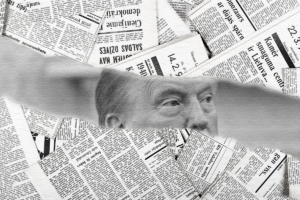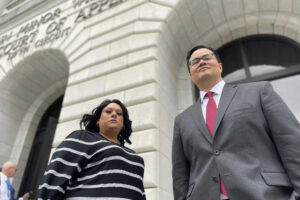From ‘Satisfactory’ to ‘Problematic’: Press Freedom in the U.S. Hit an All-Time Low
Legislative assaults on the media are a key driver of the downward spiral. (Image: Adobe)
(Image: Adobe)
Adapted from “State of the Free Press 2025,” edited by Mickey Huff, Shealeigh Voitl and Andy Lee Roth, and published on Dec. 3, 2024, by The Censored Press and Seven Stories Press.
A 2024 Pew Research Center poll found that a remarkable 73% of adult Americans believe a free press is either extremely or very important to the well-being of society — though only a third of those polled believe that U.S. media are completely free to report news. Indeed, half of those surveyed believe that U.S. news organizations are influenced a great deal by corporate/financial interests (51%) or government/political interests (49%). Citing reports by the Associated Press and the Columbia Journalism Review, the Pew Research Center noted that “recent high-profile incidents such as a police raid on a Kansas newsroom and a government seizure of a Florida journalist’s materials have raised questions about press freedom in the U.S.”
Pew reported its findings in anticipation of World Press Freedom Day and before Reporters Without Borders (a.k.a. Reporters Sans Frontières, or RSF) published the 2024 edition of its annual World Press Freedom Index. The United States ranked 55th among 180 nations for press freedoms in 2024, according to RSF, which defines press freedom as “the ability of journalists as individuals and collectives to select, produce and disseminate news in the public interest independent of political, economic, legal and social interference and in the absence of threats to their physical and mental safety.” RSF found press freedom is “problematic” in the United States, which earned a score of 66.59 out of a 100, a decline of nearly five points, compared to 2023 when the United States ranked 45th in the world based on “satisfactory” levels of press freedom. Noting that the United States was “once considered a model for freedom of expression,” RSF reported that in 2024, “major structural barriers to press freedom persist,” including, for instance, highly concentrated media ownership that appears “to prioritize profits over public interest journalism,” declines in both local news and public trust in media, and the enactment of state and local laws that limit journalists’ access to public spaces.
The United States ranked 55th among 180 nations for press freedoms in 2024.
From a global perspective, RSF noted “a worrying decline” in respect for media autonomy, increased pressure from state or other political actors, and “a clear lack of political will on the part of the international community to enforce the principles of protection of journalists.” Nowhere has the latter been more evident than in Israeli-occupied Palestine, including Gaza especially, where RSF reported a “record number of violations against journalists and the media” since October 2023, including the killing of Palestinian journalists by Israel Defense Forces.
Plunging press freedom in the U.S. is driven by a number of factors. Legislative attacks on media during the past year are one of the most ominous. In April 2024, Congress passed what is known as the TikTok “divestment-or-ban” bill, which President Joe Biden quickly signed into law. In the Senate, the legislation passed as a rider on a measure to provide $95 billion in mostly military aid to Ukraine, Israel and Taiwan, the international news agency Reuters reported. The military aid warrants concern in its own right, but the added censorship of the popular social media platform is deeply problematic. As Omar Zahzah observed in a June 2024 article for Electronic Intifada, “It is no surprise that a bill furthering U.S. funding for imperialism and genocide should also fortify U.S. imperialism on the digital front.”
Sen. Ron Wyden, D-Ore., warned that the legislation “provides broad authority that could be abused by a future administration to violate Americans’ First Amendment rights.” Sen. Ed Markey, D-Mass., went further, warning, “We should be very clear about the likely outcome of this law. It’s really just a TikTok ban. … Censorship is not who we are as a people. We should not downplay or deny this trade-off.”
TikTok was ostensibly targeted because it is owned by ByteDance, a Chinese company. Even though other popular social media platforms also share user data for profit, violate users’ rights to privacy, contribute to the spread of misinformation and disinformation and foster internet addiction, Congress and the White House singled out TikTok as the real threat. Their reasoning was that TikTok alone operated under Chinese influence and could share U.S. users’ data with the Chinese government.
Not long after Biden enacted the ban, which would force ByteDance to divest and allow a U.S. company to assume control of the platform by early 2025, Secretary of State Antony Blinken and Sen. Mitt Romney, R-Utah, publicly admitted that the real reason TikTok had been targeted was its potential influence on the American public regarding Israel’s relentless bombardment of Palestinian civilians.
As protests spread across U.S. colleges and universities in the spring of 2024, Romney questioned why Israel’s messaging on Gaza had been so “awful,” noting that “typically the Israelis are good at PR. What’s happened here?” Blinken quickly replied that those who opposed Biden’s support for Israel were being manipulated by social media, and TikTok in particular. Blinken went on to say that those pushing for a ceasefire were “on an intravenous feed of information with new impulses, inputs every millisecond,” and “the way this has played out on social media has dominated the narrative.” Ryan Grim of the Intercept called the exchange an “incredible historical document” that revealed how high-ranking U.S. officials seek to control narratives and restrict information, especially around Israel and Gaza.
Congressional zeal to throttle freedom of information did not stop at TikTok. Echoing the xenophobia that fueled anti-terrorism legislation after 9/11, in April 2024, the House of Representatives took aim at nonprofits, passing — by a vote of 382–11 — legislation that would authorize the secretary of the treasury to unilaterally remove the tax-exempt status of any 501(c)3 nonprofit determined to be a “terrorist supporting organization.”
The United States needs journalists who refuse to toe the line more than ever.
The legislation prompted the Charity & Security Network, a resource and advocacy center for nonprofit organizations that work in conflict zones, to warn policymakers of “the parade of horribles that could cascade from this broad legislation that uses the targeting of charities as a vehicle for larger political motives.”
Although numerous anti-terrorism laws already restrict nonprofits — like other organizations — from providing funding to foreign terrorist organizations, making the proposed legislation “redundant and unnecessary,” according to the Charity & Security Network, the Senate quickly introduced a companion measure, S. 4136, after the House voted its approval.
Seth Stern, director of advocacy at the Freedom of the Press Foundation, explained that the legislation could provide new, more robust tools for government officials to target nonprofit news organizations. Noting that elected officials have already called for terrorism investigations of the New York Times, Reuters, CNN and the Associated Press, Stern warned against “passing overbroad and unnecessary new laws” that provide government officials with “brand new ways to harass and silence journalists who don’t toe the line.”
With multiple ongoing crises and an increasingly unstable world, the United States needs journalists who refuse to toe the line more than ever. The fundamental missions of journalism are to hold the powerful to account and to give the public the information required to be citizens of a democracy. These increasingly bold attacks on the media threaten to undermine those missions and turn our press into megaphones for government and corporate elites eager to escape journalistic scrutiny and public accountability.
Your support is crucial…With an uncertain future and a new administration casting doubt on press freedoms, the danger is clear: The truth is at risk.
Now is the time to give. Your tax-deductible support allows us to dig deeper, delivering fearless investigative reporting and analysis that exposes what’s really happening — without compromise.
Stand with our courageous journalists. Donate today to protect a free press, uphold democracy and unearth untold stories.







You need to be a supporter to comment.
There are currently no responses to this article.
Be the first to respond.